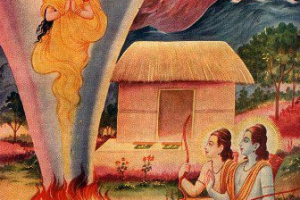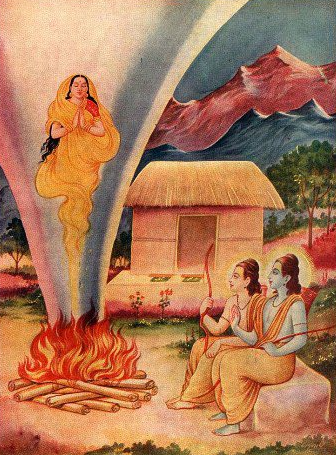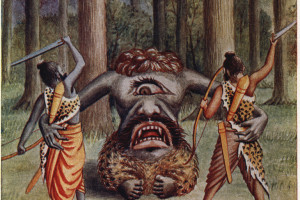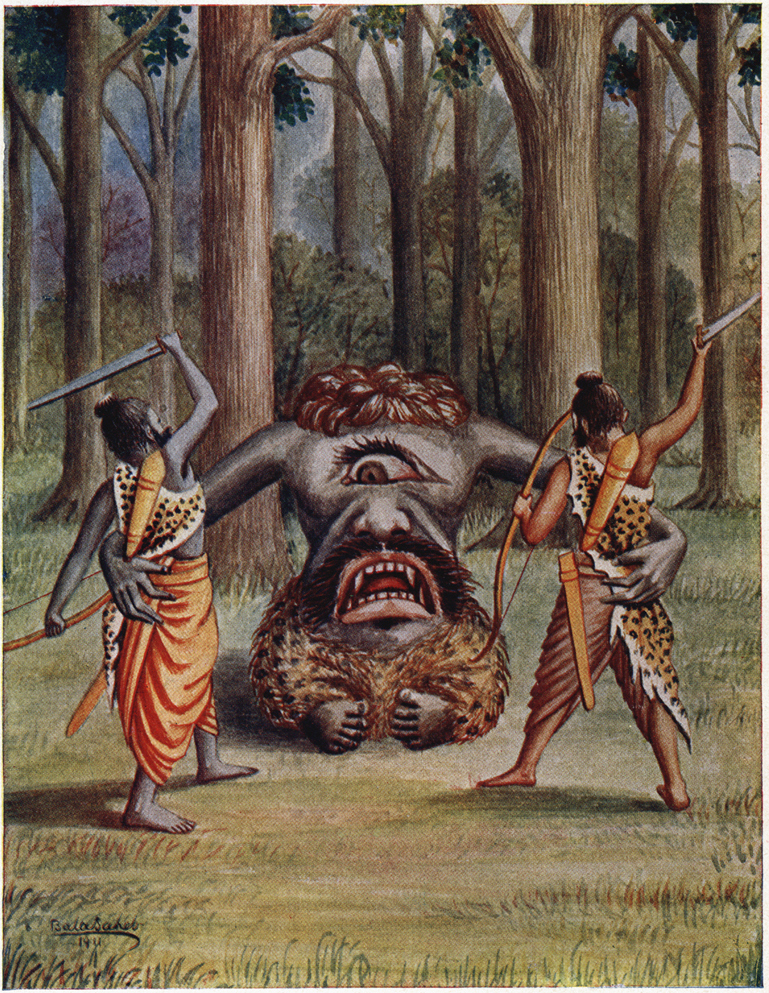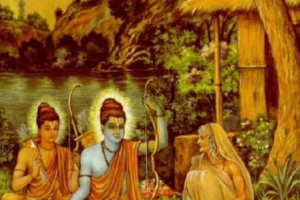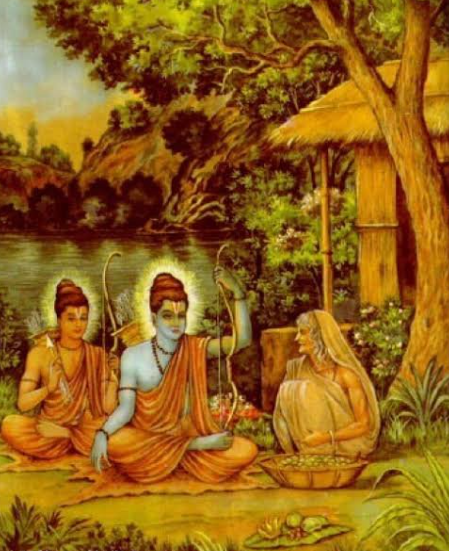Valmiki Ramayana-3: Rare Yogic Spectacle between Lord (Rama) & a Yogi (female ascetic Sabari)
Valmiki Ramayana's important Yogic Account:
Sage Valmiki who was contemporary of Lord Rama and also authored the Valmiki's Ramayana on the request of Lord Brahma and with guidance of the great hermit and spaceman Sage Narada.
In the like of Lord Rama who is one of the several Vishnu personalities and unlimited beings (parmatamas) came onto the earth in physical form several thousands of years before Lord Krishna appeared physically.
So, this is an important account to know how God personality Lord Rama interacted with a female yogi ascetic Shabari.
Shabari is spelled as Savari in the below text, treat both the words as the same name and person.
This story of female Yogi Sabari from Unabridged Valmiki Ramayana
Ashria asattar is an exceptional Sanskrit and English scholar who did an extraordinary work in translating Valmiki Ramayana in modern English and covered almost all important facets of the story line as it is except the story of female Yogi Shabari, which was abridged in her abridged version of Valmiki Ramayana.
An excerpt taken from full version of Ramayana from:
"The RÁMÁYAN of VÁLMÍKI", Translated into English Verse by Ralph T. H. Griffith, M.A. (1870-1874).
It was done more than 150 years ago, the english emploeyd here is in old english in poetic fashion.
Source link from Full version of Ramayana: https://www.gutenberg.org/files/24869/24869-pdf.pdf
Irony is Shabari's name has been manufactured as the poster icon of the bhakti or devotional sects but in reality when we read Valmiki Ramayana which is orignal text), she is an exemplary yogi that Lord Rama himself certifies her yogic feats before tlaking about her devetion towards her.
This account is mainly for yogic reads. I have taken the old english verses and formatted and added headings to make it easier for the readers.
Brief summary & Timeline of events:
- Kabandha extolls Pampa Forest and advises Lord Rama & Lakshmana to visit
- (Pampa forest is where several yogis' like Matanga rishi lived)
- Lord Rama & Lakshmana spotting Shabari's home in Pampa Forest:
- Shabari spots and pays her respects to Lord Rama & Lakshmana:
- Shabari offering water to Lord Rama & Lakshmana:
- Lord Rama's praise of Shabari's yogic achievements & austerities:
- Shabari overflowing in happiness in meeting Lord Rama & Lakshmana and nearing her liberation
- Shabari narrates the Holy Prophecy from the Heaven on her liberation
- Shabari offering of forest fruits to Lord Rama
- Rama's tacit nod to her request & Shabari's gathers woods and goes to the spot for leaving her mortal body
- Shabari's last reminiscences before leaving her body:
- Last Memories of the austerities she did
- Last Memories of the forest where she dwelled for so long
- Shabari is seeking final nod from Lord Rama to leave her old physical body
- Lord Rama gives final approval to let Shabari cast her old mortal shell to the flames
- Shabari transforms into a lustrous adorned subtle body from the flames and Relocates to higher celestial worlds
Pg 1125
Canto LXXV. Savarí.
1. Kabandha extolls Pampa Forest and advises Lord Rama & Lakshmana to visit (Pampa forest is where several great yogis' like Matanga rishi lived):
Thus counselled by their friendly guide
On through the wood the princes hied,
Pursuing still the eastern road
To Pampá which Kabandha showed,
Where trees that on the mountains grew
With fruit like honey charmed the view.
They rested weary for the night
Upon a mountain's wooded height,
Then onward with the dawn they hied
And stood on Pampá's western side,
Side Story:
Kabandha advises Lord Rama and Lakshmana (Rama’s brother) to enter the Pampa forest. Who is this Kabandha?
Some back story about Kabandha: (Taken from Wikipedia)
Kabandha (कबन्ध, Kabandha, lit. "headless torso") is a Rakshasa (demon) who is killed and freed from a curse by the Lord Rama and his brother Lakshmana.
Kabandha was a gandharva (celestial musician) named Danu, who was cursed and made into an ugly, carnivorous demon by Indra, the king of heaven.
In an encounter with Rama and Lakshmana, the brothers sever his arms and proceed to cremate his corpse. Upon his death, Kabandha resumes his Gandharva form and directs Rama to the Rishyamukha mountain in Pampa forest, where the exiled monkey-chief Sugriva is hiding.
Kabandha advises Rama to form an alliance with Sugriva, who would be of assistance in the search for Rama's wife Sita, who had been kidnapped by Ravana, the demon-king of Lanka. Following Kabandha's advice, Rama goes into Pampa forest to befriends Sugriva and rescues Sita with his help.

2. Lord Rama & Lakshmana spotting Shabari's home in Pampa Forest:
Where Savarí's fair home they viewed
Deep in that shady solitude.
The princes reached the holy ground
Where noble trees stood thick around,
3. Shabari spots and pays her respects to Lord Rama & Lakshmana:
And joying in the lovely view
Near to the aged votaress drew.
To meet the sons of Raghu came,
With hands upraised, the pious dame,
And bending low with reverence meet
Welcomed them both and pressed their feet.
4. Shabari's offerings to Lord Rama & Lakshmana:
Then water, as beseems, she gave,
Their lips to cool, their feet to lave.
5. Lord Rama's praise of Shabari's yogic achievements & austerities:
To that pure saint who never broke
One law of duty,
Ráma spoke:
“I trust no cares invade thy peace,
While holy works and zeal increase;
That thou content with scanty food
All touch of ire hast long subdued;
That all thy vows are well maintained
While peace of mind is surely gained,
That reverence of the saints who taught
Thy faithful heart due fruit has brought.”
6. Shabari overflowing in happiness in meeting Lord Rama & Lakshmana and nearing her liberation
The aged votaress pure of taint,
Revered by every perfect saint,
Rose to her feet by Ráma's side
And thus in gentle tones replied:
“My penance meed this day I see
Complete, my lord, in meeting thee.
This day the fruit of birth I gain,
Nor have I served the saints in vain.
I reap rich fruits of toil and vow,
And heaven itself awaits me now,
When I, O chief of men, have done
Honour to thee the godlike one.
I feel, great lord, thy gentle eye
My earthly spirit purify,
And I, brave tamer of thy foes,
Shall through thy grace in bliss repose.
Thy feet by Chitrakúma strayed
When those great saints whom I obeyed,
In dazzling chariots bright of hue,
Hence to their heavenly mansions flew.
7. Shabari's narrates the Holy Prophecy from the Heaven:
As the high saints were borne away
I heard their holy voices say:
“In this pure grove, O devotee,
Prince Ráma soon will visit thee.
When he and Lakshmana seek this shade,
Be to thy guests all honour paid.
Him shalt thou see, and pass away
To those blest worlds which ne'er decay.”
To me, O mighty chief, the best
Of lofty saints these words addressed.
8. Shabari's offering of fruits to Lord Rama
Laid up within my dwelling lie
Fruits of each sort which woods supply,—
Food culled for thee in endless store
From every tree on Pampá's shore.”
Thus to her virtuous guest she sued
And he, with heavenly lore endued,
Words such as these in turn addressed
To her with equal knowledge blest:
“Danu himself the power has told
Of thy great masters lofty-souled.
Now if thou will, mine eyes would fain
Assurance of their glories gain.”

9. Rama's tacit nod to her request & Shabari gathers woods and goes to the spot for leaving her mortal body
She heard the prince his wish declare:
Then rose she, and the royal pair
Of brothers through the wood she led
That round her holy dwelling spread.
“Behold Matanga's wood” she cried,
“A grove made famous far and wide.
Dark as thick clouds and filled with herds
Of wandering deer, and joyous birds.
In this pure spot each reverend sire
With offerings fed the holy fire.
10. Shabari's last reminiscences:
10.1 Last Memories of the austerities she did
See here the western altar stands
Where daily with their trembling hands
The aged saints, so long obeyed
By me, their gifts of blossoms laid.
The holy power, O Raghu's son,
By their ascetic virtue won,
Still keeps their well-loved altar bright,
Filling the air with beams of light.
And those seven neighbouring lakes behold
Which, when the saints infirm and old,
Worn out by fasts, no longer sought,
Moved hither drawn by power of thought.
10.2 Last Memories of the forest where she lived for so long
Look, Ráma, where the devotees
Hung their bark mantles on the trees,
Fresh from the bath: those garments wet
Through many a day are dripping yet.
See, through those aged hermits' power
The tender spray, this bright-hued flower
With which the saints their worship paid,
Fresh to this hour nor change nor fade.
Here thou hast seen each lawn and dell,
And heard the tale I had to tell:
11. Shabari's seeking final nod from Lord Rama to leave her old physical body
Permit thy servant, lord, I pray,
To cast this mortal shell away,
For I would dwell, this life resigned,
With those great saints of lofty mind,
Whom I within this holy shade
With reverential care obeyed.”
12. Lord Rama gives final approval to let Shabari cast her old mortal shell to the flames
When Ráma and his brother heard
The pious prayer the dame preferred,
Filled full of transport and amazed
They marvelled as her words they praised.
Then Ráma to the votaress said
Whose holy vows were perfected:
“Go, lady, where thou fain wouldst be,
O thou who well hast honoured me.”
Her locks in hermit fashion tied,
Clad in bark coat and black deer-hide,
When Ráma gave consent, the dame
Resigned her body to the flame.
Then like the fire that burns and glows,
13.Shabari transforms into a lustrous adorned subtle body from the flames and Relocates to higher celestial worlds
To heaven the sainted lady rose,
In all her heavenly garments dressed,
Immortal wreaths on neck and breast,
Bright with celestial gems she shone
Most beautiful to look upon,
And like the flame of lightning sent
A glory through the firmament.
That holy sphere the dame attained,
By depth of contemplation gained,
Where roam high saints with spirits pure
In bliss that shall for aye endure.

Female Ascetic Shabari Yogic achievement & Austerities:
It is interesting that Lord Rama himself notes these features and enumerates it to Sabari:
Yogic Accomplishement:
- Unperturbed peace, equanimity even during holy works and exciting times (Karma Yoga)
- All forms of anger have been subdued long ago (Buddhi Yoga)
- From Bhagavad Gita (2.62), which came after several thousand years after Rama, Krishna says anger comes the attachment to sensual objects.
- This level of Anger control which was praised by Lord Rama himself shows the her level of detachment and sense control.
- Purified & Faithful devotion form her purified psyche (Bhakti Yoga)
Austerities:
- Content with scanty food
- Maintained strict and strong vows unflinchingly
- Respect and attendance to her spiritual masters
All this has brought her to stage to reap her due fruit of her austerities.
From yogic perspective, we can see the underlying and her shrouded yogic achievements behind her devotion and the final relocation to celestial worlds.
Shabari lived more than 15,000 years and had a yogic legacy until modern writers of Ramayana came in last 300-400 years.
In last 500 years, Shabari is the marketing symbol of all devotional sects throughout India after Balaram Das wrote his Odia Dandi Ramayana. I have added the common/ twisted version below for the readers to get the feel of the depth of fallacy and twists he made to her real story to commercialize it to the appetite of the masses instead renarrating original Valmiki's text in the local language which might have been his mission. Such corruption also makes one appreciate the yogic achievement and scholarship of Valmiki.
This would be an informative article on Shabari topic and discusses the Vaishnavism, untouchability, brahmin orthodoxy, tribes, etc:
Modern version, its corruption, twisting and fallacy on female Yogi Shabari
I personally checked Tulsidas version (1623 AD) of Ramayana (Ramcharitmanas) in local language Awadhi, it did not have the story of "Ram magnanimously accepting the berries offered by Shabari with her teeth mark and saliva".
Some writes claim it has come from another Ramayana in Odia language in India, where Balaram Das wrote his Odia Dandi Ramayana (1556 AD).
Following is the general story floated around and even in school books in India. I myself have read this in my school books. This shows the extent of misinformation and deviations spread around Shabari.
An excerpt taken from the wikipedia page on Shabari:
Even though hundreds of other yogis were waiting to receive Rama in their ashrams, Rama went only to Shabari's ashram because of her sincere devotion.
- On seeing Rama, Shabari became ecstatic and said, "There were so many exalted yogis waiting for your darshan, but you came to this unworthy devotee (...)
- This clearly shows that you will neither see whether a devotee lives in a palace or humble hut, whether he is erudite or ignorant (...) neither see caste nor color.
- You will only see the true bhakti (...)
- I do not have anything to offer other than my heart, but here are some berries.
- May it please you, my Lord."
Shabari offered the fruits which she had meticulously collected. As Rama tasted them, Lakshmana raised the concern that Shabari had already tasted them (had teeth marks & saliva) and they were, therefore, unworthy of eating.
To this, Rama responded that, of the many types of food he had tasted, "nothing could equal these berries, offered with such devotion. You taste them, then alone will you know. Whomsoever offers a fruit, leaf, flower or some water with love, I partake in it with great joy."
Traditional writers use this narrative to indicate that in bhakti, faults are not seen by the deities. Pleased with Shabari's devotion, Rama blesses her with his vision. Rama notices the donas, or bowls, of handmade leaves in which she had offered the fruits and is impressed by the hard work Shabari has gone through to make them and, hence, blesses the tree so that the leaves naturally grow in the shape of a bowl.
Shabari also tells Rama to take help from Sugriva and where to find him. The Ramayana says that Shabari was a very bright and knowledgeable saint.The ashram in which Shabari stayed and waited for Lord Rama was called as Shabari Narayan which was situated in today's Shivrinaryan, a town located in Janjgir-Champa district in Chhattisgarh.
Links to Books:
Abridged Version: https://www.amazon.com/Valmikis-Ramayana-Arshia-Sattar/dp/1538113686
After discussing with Madhva, he recommended me Arshia Sattar's Valmiki Ramayana (1996). It is an abridged version, she made complete justice in this translation, an extraordinary work.
Full version: https://www.gutenberg.org/files/24869/24869-pdf.pdf
There are several authors on market, but these are the best translations, and were approved by Madhva to me.
Post script:
These are previous posts on Ramayana by Maddhva:
- https://inselfyoga.com/page/view-discussion?id=7461
- https://inselfyoga.com/page/view-discussion?id=7235
- https://inselfyoga.com/page/view-discussion?id=4599
They give a good background on why Valmiki Ramayana is so important when compared to other authors.

